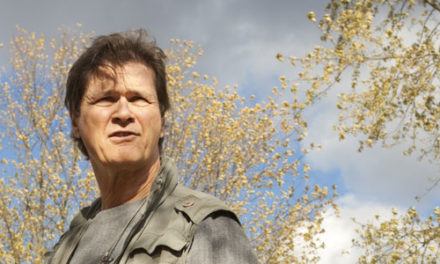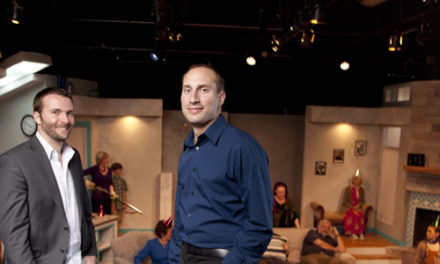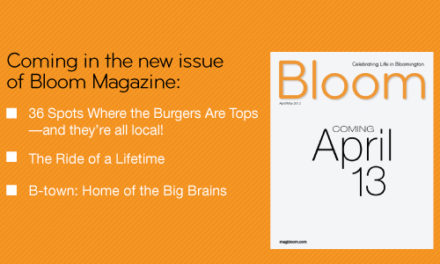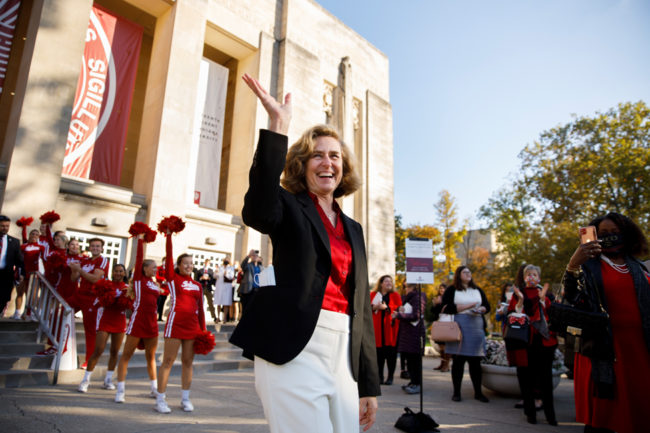
Interview by Malcolm Abrams and Sophie Bird
Photography by Rodney Margison
She is Indiana University’s first woman president in 201 years, but that’s not all that makes Dr. Pamela Whitten different.
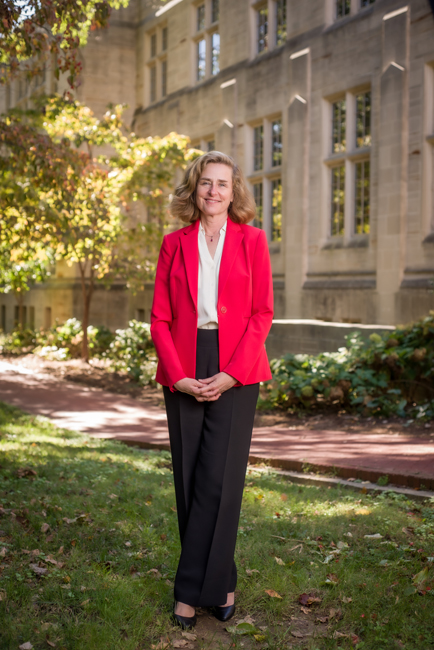
When asked how she would like to be addressed, she simply replied, “Call me Pam.”
As the Bloom editorial staff drove to meet President Whitten at Bryan Hall, we saw her walking alone along East 4th Street, noticeable in her bright red blazer. She had a takeout cup from Soma in hand, which she later told us contained a chai tea latte. Soma is located several blocks away from Bryan Hall—the Indiana Avenue Starbucks is closer—but President Whitten prefers local.
IU’s 19th president is out there—mixing it up with students, faculty, and regular Bloomingtonians. She is friendly, unpretentious, and seems to easily engage with everyone. Walking with her near the Sample Gates, we noticed that students waved to her as she passed. Two students stayed to watch our outdoor photo shoot and hung around to chat with her. “We just wanted to meet Pam,” they told us.
President Whitten is a private person. She is reticent to talk about family or her adolescent years, but the details she was willing to provide indicate a close-knit family with her children and grandchildren, husband, and siblings.
“Putting students first” is her mantra, an objective any university president might expound. But President Whitten is all about the students— interacting with them, listening to them, sharing their concerns. And as friendly and warm as she was during her October 18 interview with Editor Malcolm Abrams and Deputy Editor Sophie Bird, it was during those moments with students that she really connected.
We hope this question-and- answer interview will help you get to know the 19th president of Indiana University a little better.
ABRAMS:
What’s your impression of Bloomington so far?
PRESIDENT WHITTEN:
It’s fantastic. It’s so funny because I get asked all the time, “What do you think about Bloomington? How do you like living here?” And I always just want to say to the person, “You live here, how can you even ask that question?” Right? I mean, I think it’s the best college town in America.
ABRAMS:
There’s so much curiosity in the community about you, because in 201 years there have only been 19 IU presidents—and you’re the first woman. But there’s so little information that’s been published about you. So, here goes. Let’s start at the beginning—where were you born?
PRESIDENT WHITTEN:
Tallahassee, Florida. But I didn’t live there very long.
ABRAMS:
Where did you grow up?
PRESIDENT WHITTEN:
You know, it was really a mix of places. When I was very young, I lived in the Midwest, then I lived in Tennessee until high school, and then when I was 14 my parents moved to New England and I went to high school in Rhode Island. And then I went back down to Tulane to go to college and began the great adventure.
ABRAMS:
What did your parents do?
PRESIDENT WHITTEN:
My mom was a stay-at-home mom, and my dad, it’s hard to explain what he did. He did work in what initially was the public sector, and then when we moved to Rhode Island, he was the executive director of a nonprofit organization that did work to try to figure out how you maximize use of public resources to optimize outcomes. He did all kinds of projects for many, many years. Obviously, he’s been retired for a while now.
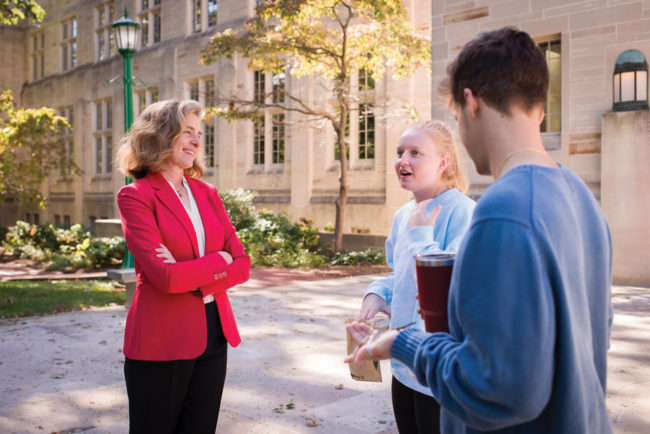
ABRAMS:
What kind of kid were you? Were you
a cheerleader, were you a science nerd, somewhere in between? I know you’re interested in athletics. Were you an athlete?
PRESIDENT WHITTEN:
I grew up in a time when if women or girls weren’t elite athletes you just didn’t really play sports. There wasn’t that much opportunity. So, no, I wasn’t an elite athlete at all. But I’ve always liked playing pickup games and running and all those kinds of things.
ABRAMS:
What were your interests as a kid, as a teenager?
PRESIDENT WHITTEN:
I was already watching a lot of sports as a kid. I’ve loved college sports forever, ever since I was a very little girl. I was into school—I was a pretty good student. I had a very healthy social life in high school, as well. I would say I was just kind of a run- of-the-mill kid.
ABRAMS:
Do you have siblings?
PRESIDENT WHITTEN:
I do. I have a sister, who’s about 15 months older than me, and I have a twin brother.
We are fraternal twins. Growing up, I can’t tell you how many people have asked us—they still do—“Are you and your brother identical twins?” and I’m just like, “Nope, we’re not.” And then I have a little brother also.
ABRAMS:
Are they scattered around the country?
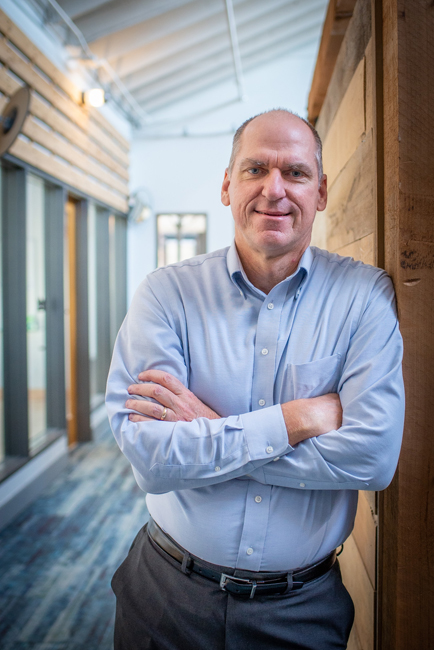
PRESIDENT WHITTEN:
A little bit. They all have similar lives and lifestyles. They all went on to do wonderful things in their careers and, like me, all got married and stayed married forever and had kids. We’re still all very close.
ABRAMS:
How long have you been married?
PRESIDENT WHITTEN:
Thirty-six years. Since 1985. I was 21. We got married in Rhode Island a week after we graduated from college.
ABRAMS:
Your husband, Jason, I’ve heard him described as an IT entrepreneur.
PRESIDENT WHITTEN:
He’s a software developer. And he works primarily on a consulting basis.
ABRAMS:
In everything that I’ve read about you, you point out three major areas that you are concerned about: putting students first, research and discovery, and improving the lives of people throughout Indiana.
PRESIDENT WHITTEN:
Thank you for knowing that. Those are the three core missions that we have as an institution, so moving forward, I think we want to stay focused on accomplishing them, and obviously there is a lot of interplay and overlap between the three.
ABRAMS:
Sophie, who graduated from The Media School in 2019, will ask you some questions later about the student experience. I’m interested
in the idea of expanding the economy in Bloomington, Monroe County, and beyond. Can you elaborate?
PRESIDENT WHITTEN:
That means a couple things to me. It means being cognizant of preparing tomorrow’s workforce for all the different things that a local community in the state of Indiana needs. And sometimes that’s a direct profession or skill set for today, but just as much it’s about being thoughtful about the careers or jobs that our graduates will have in 10 or 20 years. We all know in the last decade or two we’ve seen people graduate, and then five years later there’s jobs we never heard of before that exist. So, we have to think about how you prepare people to pivot to those kinds of changing professions and careers.
It also includes doing what we can to enhance Indiana as a place for business and industry to come. A large part, of course, is the attraction of a well-qualified workforce to bring people to the state. It also has to do with the quality of life and opportunities in the state. We want to be a partner to business and industry and state government in helping to pull industry and advance the economy in the state.
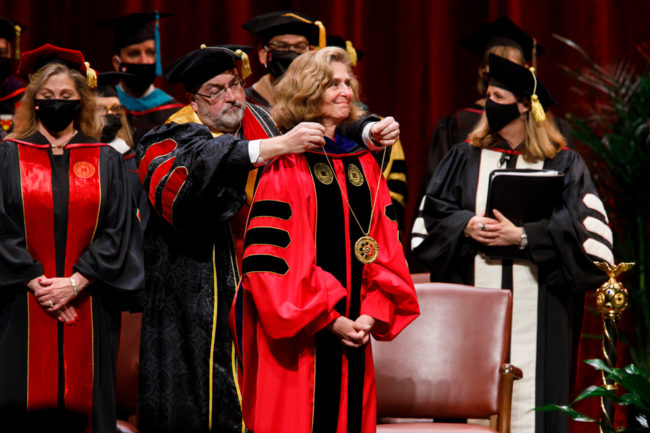
ABRAMS:
Research and discovery. Your previous university, Kennesaw, is an R2 research institution. IU is an R1. Are you up to date yet on what they’re doing here, and do you know what the priorities are?
PRESIDENT WHITTEN:
Yes, of course. And you have to remember, for many years I worked at Michigan State, so I’m used to very large R1 institutions. And then I was a provost at the University of Georgia, also an R1. I went to Kennesaw State as we became an R2, growing the research mission there. Like the other universities that I’ve been at, as an R1 we are big and we are complicated and have all kinds of research going on and multiple facets, so part of the challenge is getting your arms around what’s a priority—or, strategically, how do you move forward? And I think that some of the work that needs to be happening right now is, “What are going to be the strategic priority areas or themes for the institution?”
Right now, we’re great at a lot of things. It’s everything from just straight- up bench research that eventually ends up being a compound in medicine down the road, all the way to actual intervention where we go and we work within communities and government offices and schools and health facilities. All the way to what I don’t think gets enough attention, which is creative discovery, and that’s part of our scholarship.
We’re fantastic in humanities and arts and music and dance. And that’s a form of research as well, it just tends to be called scholarship. IU is a fascinating place because we do all of those things. And certainly not to exclude the amazing work that goes on in our med school. I don’t know if you follow any of that, but if you haven’t gone to look at what’s going on— particularly in Alzheimer’s disease research at the IU School of Medicine—it’s amazing, among the best in the country.
ABRAMS:
Your predecessor’s spouse, Laurie McRobbie, was out working in the community quite a lot. It’s the first time we’ve had a first gentleman
in the university’s 201 years. Is your husband, Jason, going to be involved in the community? Is he going to be involved working with you?
PRESIDENT WHITTEN:
Absolutely, absolutely. Now I will say, and in the contemporary age of presidents—particularly with a female president—I think we’ll see more people like Jason. I mean, my husband works full time outside the university. I think that’s a little different, perhaps, than it’s been in the past. He has a very demanding schedule of his own. But he’s already engaged in the community. You’ll see him at lots of events, and he is thoroughly enjoying getting to know people in the community.
It was funny, at a recent football game I was in the large president’s box when several times people said to me, “Is your husband here?” I said, “Of course he’s here,” and they asked, “Where is he?” I explained that he’s talking to people somewhere. He doesn’t need to hang on my side. And he doesn’t, so he’s gotten to know lots of folks. He’s jumped into some community activities. I know he plays soccer that’s local in town. He loves to play soccer. He’s definitely engaged. He’s actually working over at The Mill.
ABRAMS:
I had heard that he might stay part of the time in Indianapolis and that you were both going to live here and there.
PRESIDENT WHITTEN:
We do. I mean, he, fortunately, has a job where he can work from anywhere. But we’re certainly in Bloomington a lot and he went and checked out The Mill and thinks it’s a great facility. He’s going to make that one of the places where he actually goes to work. And for a lot of reasons—certainly he wants to support The Mill because the principle, we think, is fantastic for the area. But he also thinks it’s just a great place to go meet, work, and be with like- minded people. He’s the perfect spouse for someone in my career field because all he needs is a laptop.
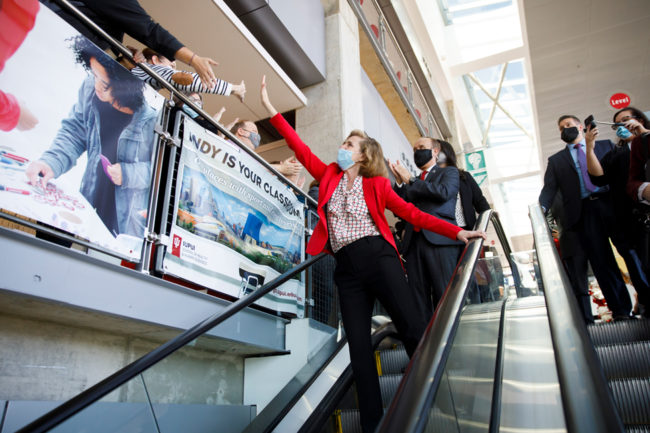
ABRAMS (JOKING):
He could work right over there. [Points to a small table in the corner of President Whitten’s office.]
PRESIDENT WHITTEN (WITH A LAUGH):
He could, but that would be irritating for him. I meet with a lot of people.
ABRAMS:
Tell us just a little about your kids—how old they are, what they’re doing, where they are.
PRESIDENT WHITTEN:
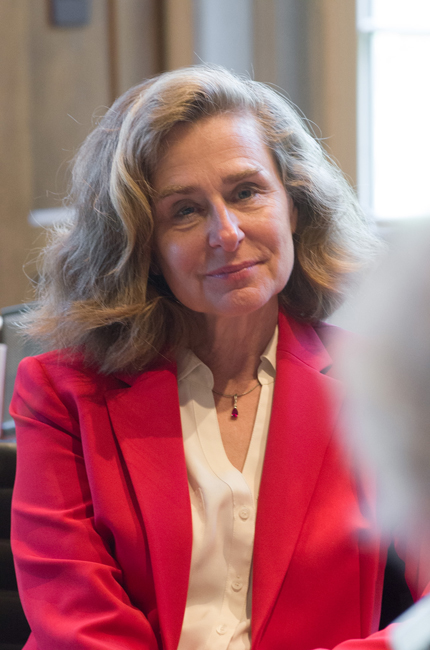
We have three. My oldest lives in Lexington, Kentucky, and she is married and has two kids, so we have grandchildren. Today, one is 6. Yay, happy birthday, Viv. And then her little brother’s 3. Gosh, my daughter, years ago, went off to college to University of Kentucky and went to graduate school there and never left. Got married, loves Lexington, has great career field of her own.
My middle child is in Nashville, Tennessee. She’s 29 and just got married before the pandemic, and she and her husband work in Nashville.
My youngest is a son, 24, and he is in Georgia. I’m secretly hoping to get him up to Indiana. He went to a small school in Pennsylvania, and then he was one of those kids who, during the pandemic his last year of college, came back, stayed with us, did it online. Missed the graduation. Honestly, it bothered me a lot more than it did him. So, he’s good. I would love to get him to Indiana, but he’s happy where he is, so we’ll see.
ABRAMS:
At the University of Georgia, you helped found the Women’s Leadership Initiative. Speak a little bit about that, and are you planning on doing something similar here?
PRESIDENT WHITTEN:
I was the provost at UGA [University of Georgia] and one of the things that was evident was that we needed to figure out what kind of professional development we could do to really entice more women to join the pipeline of administration, and to prepare them for it. We created the Women’s Leadership Initiative for that reason.
It was a very competitive program. There would be a cohort every year that spent a lot of time together and a lot of time getting to see the inside of a big university and how it works. And it was fantastic and many of them went on to jump into administration in bigger ways and so it was very successful there.
To determine if we need to implement something similar at IU, I need to understand what is currently happening. But certainly, in principle, we want to make sure we have amazing, robust programs, both for women and for underrepresented populations, so that we are preparing folks to step in and replace leadership as needed.
ABRAMS:
Telemedicine. That’s one of your big interests.
PRESIDENT WHITTEN:
It was a big part of my life. I was a very active researcher in the field of telemedicine.
ABRAMS:
Is that going to carry over here do you think?
PRESIDENT WHITTEN:
I hope so. I’m trying to persuade the med school to let me jump on a project. It’s funny. I did research in telemedicine for many, many years, from the early 90s on, when there wasn’t very much going on, and did a lot of work with big research teams and got a lot of external funding to test efficacy and outcomes, and it just took a pandemic for it to become ubiquitous.
ABRAMS:
When you talk about telemedicine, are you primarily talking about doctors interacting with patients over the internet?
PRESIDENT WHITTEN:
That’s a typical understanding. But it goes beyond that. Teleradiology has been around for years,
but there are fields like dermatology and others where it doesn’t have to be in real time. It can be asynchronous. You can send a physical history and images and someone can diagnose that way. So, we stereotypically think of it as being something in real time where there’s a provider to a patient. It doesn’t just have to be a physician. It’s counselors and nurse practitioners and all kinds of folks. They often have medical peripheral devices so they can gather data in real time. But it really can be both—it can be asynchronous or synchronous. That’s probably more than you want to know.
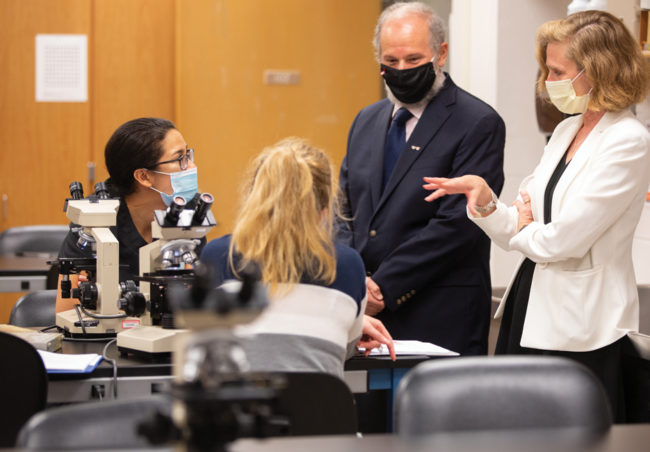
BIRD:
I’m interested in hearing about the ways in which you feel IU could expand access to mental health services for students.
PRESIDENT WHITTEN:
Thank you for asking that. So, when I first came here, truly my first weeks, the first thing I did was attempt to gather information about what we do, and not just in Bloomington but across all of our campuses. And what resources are strong and where are there gaps and what needs fixed. And it became evident that there are two things: One is that there are a lot of wonderful services here, but often people don’t know about them, so we have communication challenges. But the other is that it’s a new day after the pandemic and we need to be much more thoughtful and intentional about meeting students where they need to be met to take care of things. So, we have a new chief health officer, Aaron Carroll, who basically oversees all things related to health. Brand new position just created. Reports directly to me.
ABRAMS:
Did you create that position?
PRESIDENT WHITTEN:
It was created as I was coming in and I approved it. Dr. Carroll is working on multiple projects, but one of the first big ones I gave to him was to take on mental health—behavioral health—services for students. He is in the process right now of doing a lot of work, figuring out all the things that we do, figuring out what’s done well, where the gaps are, and then he and his team are going to be making a list of recommendations to me that’s due in January to figure out what else we need to be doing.
BIRD:
And do you see that intersecting with your interest in telemedicine, to make mental health services more accessible to students?
PRESIDENT WHITTEN:
Absolutely. One of the things that we learned during the pandemic is there are many, many things that people were very happy to come back to and do in person, but we also know that there’s a lot of things that people are more accepting of or even comfortable with doing virtually. It’s about figuring out that sweet spot.
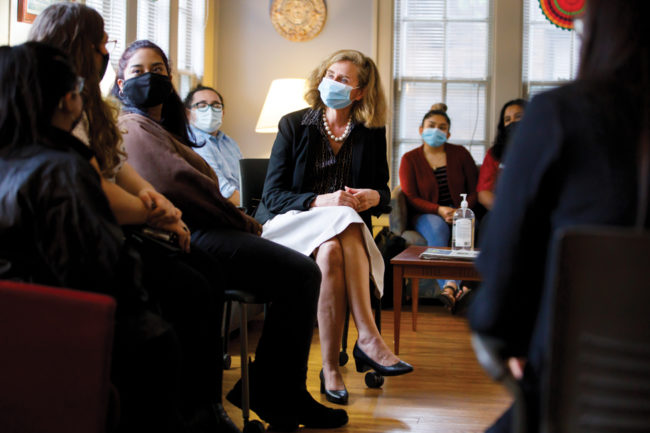
BIRD:
How does IU plan to continue supporting neurodivergent students so that they can be as successful as possible? Students who have autism or ADHD or other learning differences that might make it difficult for them to succeed in a traditional college environment.
PRESIDENT WHITTEN:
I’ve toured and met with the Office of Disability Services and I’m aware that there are a number of services available, but I’m not in a position to speak to them specifically yet.
BIRD:
Can you tell us a little bit about your commitment to diversity on the IU campus?
PRESIDENT WHITTEN:
Issues of diversity, equity, and inclusion [DEI] have been very important to me for a very long time at all the institutions that I’ve worked at, and so at IU I will say that I think there has been the right intent for a while. People are very vested, and so it’s nice to come into an institution where this is such a value to so many people. Now it’s rolling up your sleeves and doing the hard work and figuring out how you can actually make a difference. You might have read that a couple of weeks ago, I announced a new $30 million investment. It’s a presidential diversity hiring initiative, and it is directed at bringing in underrepresented people for faculty positions.
It’s for over seven years, and it’s in any field, at any campus. It was very intentional to help us transition from having the value to committing the resources.
BIRD:
Do you feel like there’s a significant difference in the way that faculty members need assistance in the DEI realm versus students?
PRESIDENT WHITTEN:
There are certainly some issues that are similar if you look at culture and issues related to climate, and if you look at issues related to opportunities. I think feeling appreciated and having a sense of belonging would apply universally no matter what your role at the university. But there are also differences, too. From the perspective of faculty, we need to ensure that we create the mechanisms for them to be successful. And we know that there are unique challenges sometimes for underrepresented faculty members that we really need to get in front of. From the perspective of students, they have a very different viewpoint. Often, you’re talking about their experience in the classroom, or experience with opportunities, and with other students. I think there are similar issues and I think there are unique issues based on everyone’s position.
BIRD:
Your predecessor, Michael McRobbie, was very invested in international relationships, is that something that you plan to continue putting a lot of resources into?
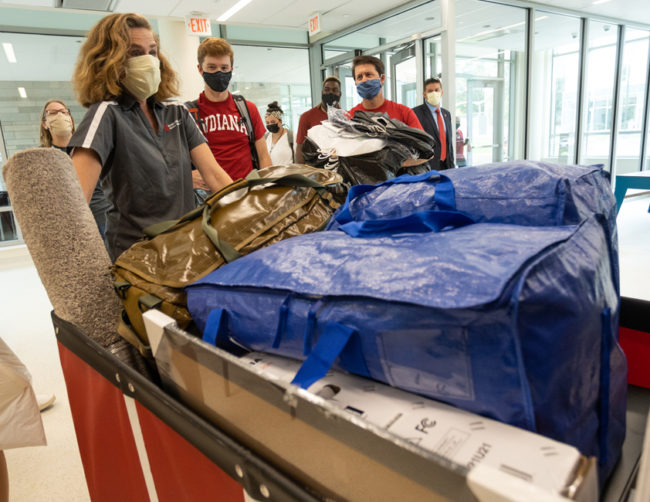
PRESIDENT WHITTEN
Sure. One of the strengths of IU is the role we play on the global stage, and we see that locally in the institution with just phenomenal programs, for example, in foreign languages. I don’t know if any university teaches more than we do, but they certainly don’t do it as well as we do.
ABRAMS:
IU teaches more than 80 languages. I think that’s the most of any university.
PRESIDENT WHITTEN:
Most recently, in Afghanistan, we were called to help with some things. [Part of the involvement was assisting with arriving refugees at Camp Atterbury, including with translators. Also, IU supplied research for Homeland Security.] And so that will continue, certainly, and that transcends to many areas. Whether it’s the direct areas like the Hamilton Lugar School [of Global and International Studies] or even indirect, like the Kelley School [of Business] and other areas. We have to have those kinds of global interconnections.
BIRD:
What are some areas that you feel the university could improve on to create a better environment for students?
PRESIDENT WHITTEN:
I think there are a couple of areas. I think that there’s movement to be made in traditional metrics of success—retention, and graduation rates. Not a big movement—we’re very good—but I certainly think there’s opportunity.
I think there’s movement to be made in helping decrease student debt when students graduate. Again, we’ve made some great strides in the last three years, but I think there’s more real estate and I think we need to take very seriously the cost of college and what a big impact it has on so many families.
I think there’s room to navigate on the qualitative side in the experience that we create for students, making sure that that we create an experience that’s unique enough so that when our students go to interview for jobs or internships or graduate school, everybody will know, “Oh you’re an IU student and you’ve had some experiences that set you apart and really reflect the values of the institution and the region.”
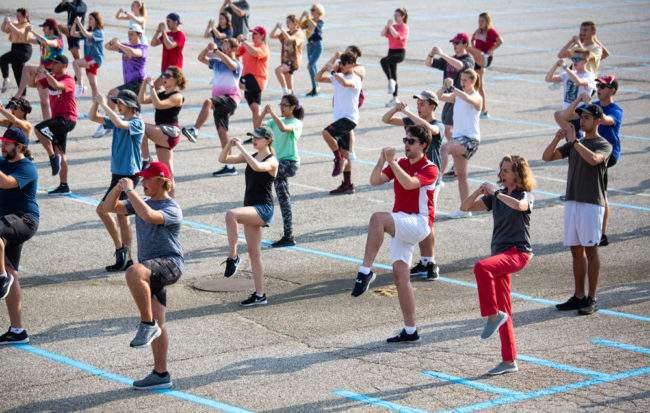
BIRD:
How do you plan to encourage students to get additional learning experience outside the classroom and to really stress that that’s an important part of being an IU student?
PRESIDENT WHITTEN:
Well, much of what we need to do is expand the work that we do as a university with the private sector, in the public sector, and other spaces so that there are more formal opportunities and partnerships and pipelines for students. And we also need to facilitate the matchmaking part of this, so that organizations know how to find students and students know how to find the organizations.
BIRD:
Are you planning to increase access to jobs for IU students after graduation? I feel like that’s a very similar sort of matchmaking process.
PRESIDENT WHITTEN:
Yes, I think so and I think there’s also room to look at improving it university wide. I think at this point, it’s fairly decentralized across the institution, and we need to look at how we make sure that every student, no matter what they’re majoring in, has access to opportunities to be partnered with a great job opportunity.
BIRD:
So how does IU plan to support cost-conscious students as the cost of living in Bloomington continues to rise? I know that’s been a big subject over the last couple of years, especially with a lot of the new apartment buildings going up. With scholarships or other opportunities?
PRESIDENT WHITTEN:
Well, that’s part of what I referenced earlier. We’ve got to be focused on the cost of college, which is not just tuition and fees, it’s also the living expenses associated with going to college. We’ve got to think about the whole cost of the attendance package.
ABRAMS:
Is there anything that you would like to share that we haven’t touched on?
PRESIDENT WHITTEN:
I will share with you—and I’ve shared this story with other folks as well—that when we lived in Michigan, we used to vacation in Brown County [Indiana]. We rented places and we’d go hiking and we’d come into Bloomington to go to dinner. We would walk the campus because I’m one of those people who loves college campuses. It always struck us just what an amazingly beautiful campus this is. So, as the years went on and we lived in Michigan, we lived in Georgia, and we traveled, and people would say, “What do you think is the most beautiful campus?” Because we’ve been on a lot. My husband would always say, “Well, IU in Bloomington.” And so we think it’s such a funny karma thing that we ended up here, because this campus always stood out to us. It’s just so striking and it’s a wonderful place.


